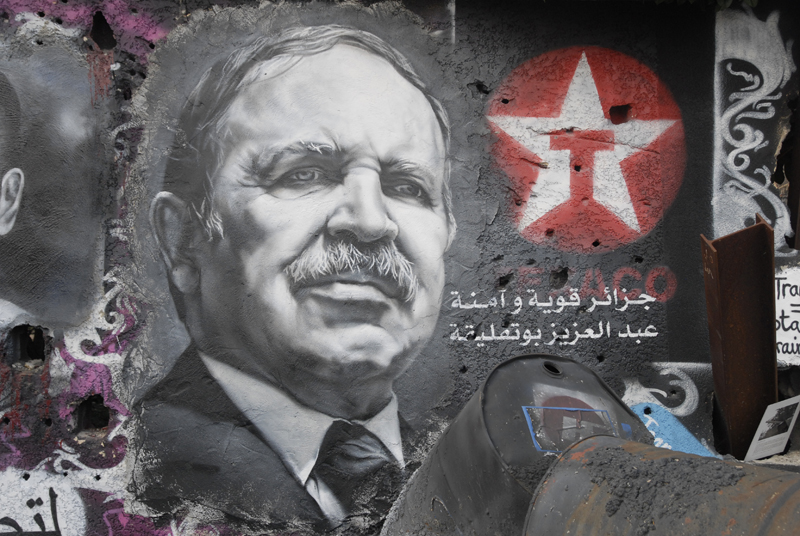
Algeria may be teetering on the brink of a crisis, with the three pillars of the regime’s stability—its powerful military, abundant revenues from hydrocarbons, and the façade of a democratic political system—beginning to crumble. Despite the lack of attention in Western media, Algeria is undergoing what could be viewed as a pre-revolt stage, as the state faces simultaneous security, social, and political challenges. Perhaps most immediately worrisome, various jihadist groups based inside Algeria’s borders are carrying out low-level acts of violence and terror that are challenging the state’s military strength and its ability to secure its borders.
Some of these violent groups have their roots in the long war waged by the state against the Islamist revolt in the 1990s. The armed factions originally affiliated with the Islamic Salvation Front, the Islamist party brutally suppressed by the Algerian military’s takeover in 1992, transformed into terrorist groups by the mid-2000s, carrying out random attacks against military forces, police outposts, and government buildings. This low intensity guerrilla war has so far been unable to inflict fatal blows to the regime. However, after the fall of Muammar al-Qaddafi’s dictatorship in Libya and the consequent collapse of security in the whole Sahel region, new terrorist groups linked to al-Qaeda in the Maghreb and/or other criminal organizations have penetrated Algerian territory and conducted attacks against state institutions, oil fields, and have kidnapped foreign citizens for ransom.
Algerian security forces have struggled to prevent these criminal activities, and their capacity is stretched thin even by their own admission. The war in Mali and the subsequent increased presence of armed groups along Algeria’s southern border presents yet another critical front in Algeria’s struggle against terrorism. The Algerian military fears that the Islamist groups in Mali, forced to disperse by French troops that have intervened in the defense of the legitimate government of Bamakou, may cross over into Algerian territory and engage in destabilizing actions.
From a socioeconomic point of view, despite Algeria’s enormous wealth in oil and gas, the population suffers from poverty, unemployment, and citizen discontent. While still far from the mass uprising of 1988 that almost led to the collapse of the regime, Algeria is troubled by many smaller scale protests throughout the country, in particular and more recently in the southern region where conditions are particularly dire. Health sector workers have gone on strike, encouraging workers in the education and transport sectors to follow suit, and further unrest may emerge in other sectors as well. These social challenges are quite complex for a regime notoriously known for its refusal to bow in front of popular protest. The secretive, opaque, and authoritarian regime, defined by the people as “le pouvouir”, is hardly equipped to deal with this kind of social unrest and there are few channels to express frustration in meaningful ways. The government is funneling money into the system, thanks to revenues from the hydrocarbons that allow the maintenance of high subsidies for basic goods, but it is increasingly clear that this economic policy is hardly sustainable.
In addition to these challenges, the regime is witnessing a political crisis at the top of the state apparatus. The illness of Abdulaziz Bouteflika, President of Algeria since 1999, makes it highly unlikely that he will be able to run for another term with upcoming presidential elections in 2014. No clear procedure exists for the appointment of his successor, which leaves a vacuum at the pinnacle of political authority. This crisis is being exploited by the main opposition party, the Islamist Movement for Society and Peace (MSP), which has found new momentum and renewed aggressiveness with the election of the hardliner Abderazak Mokri as its head. Judging from his bellicose declarations against corruption in the upper echelons of the state and against the candidacy of Bouteflika for the presidency in 2014, the Algerian political system is headed to an interesting confrontation.
It is hard to predict the outcome of the myriad of tensions that are boiling in the country. It is possible that the Algerian people, still fatigued from the bloody civil war of the 1990s and conscious of the repressive power of the state choose not to confront the regime in any sustained or systematic way. But as the region’s contemporary history teaches us, when too many factors combine in undermining the legitimacy of a political system, and the social contract providing economic benefits and safety in exchange for political acquiescence disintegrates, anything becomes possible.
Karim Mezran is a senior fellow with the Council’s Rafik Hariri Center for the Middle East. Photo Credit.
Image: Bouteflika.jpg
